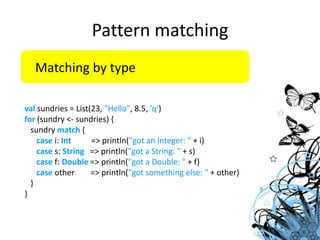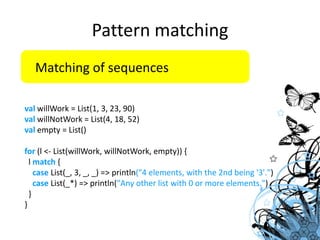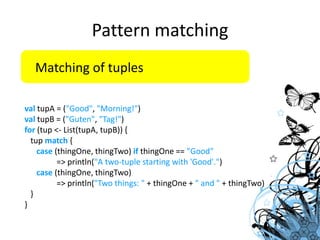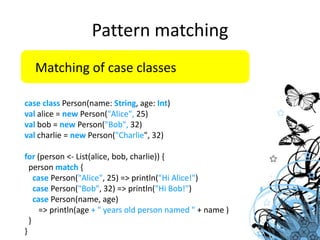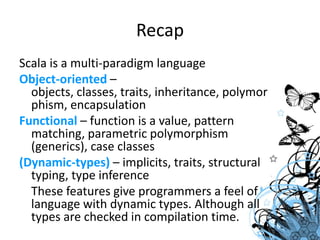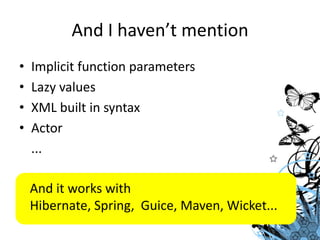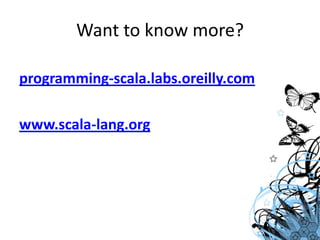The document provides an overview of the Scala programming language. It discusses how Scala removes some features from Java like break/continue and static, unifies functional programming and object-oriented programming, and treats functions as first-class objects. Key aspects of Scala covered include treating all operators as methods, higher-order functions, pattern matching with case classes, and functional operations on collections like List.
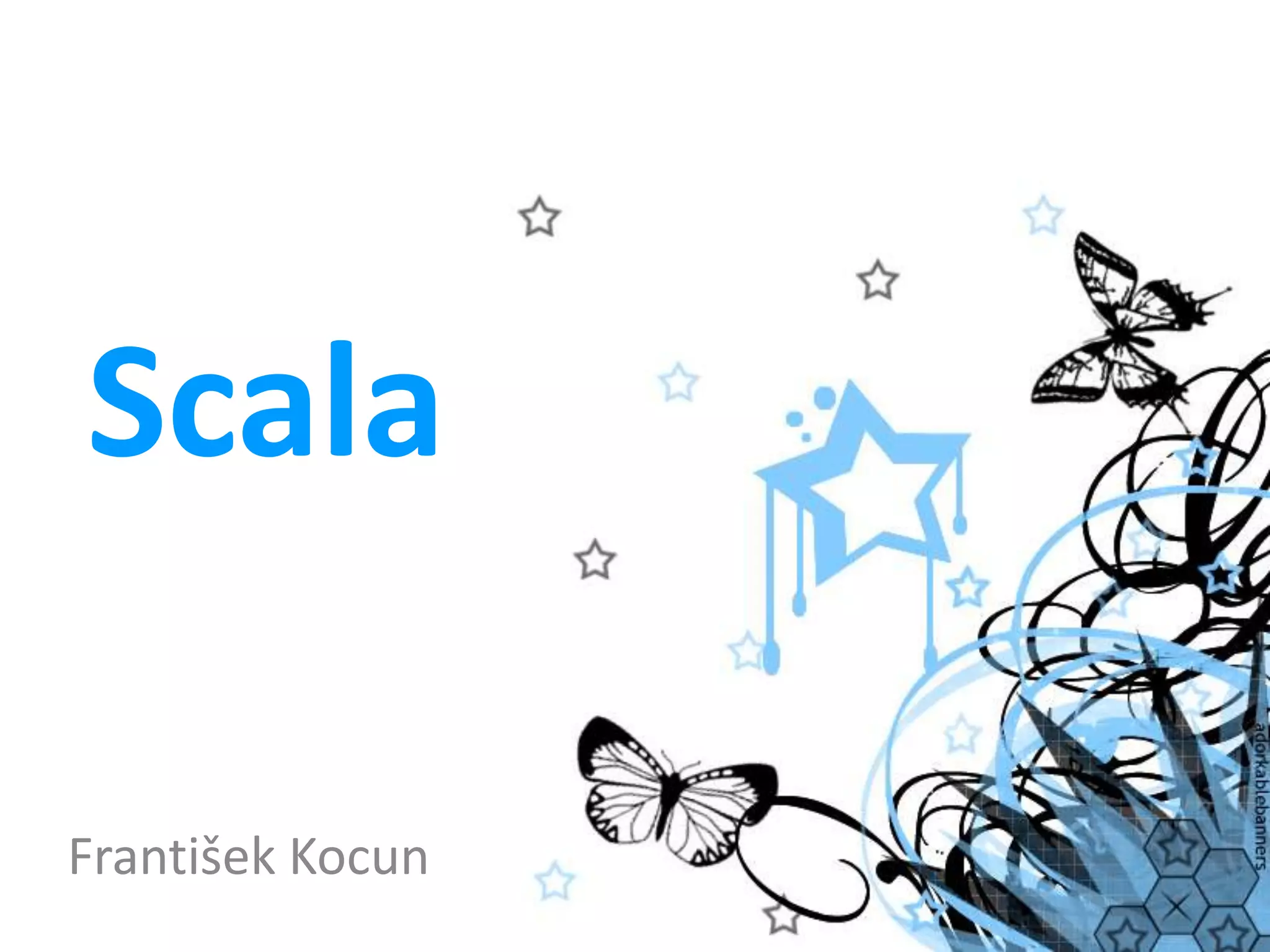
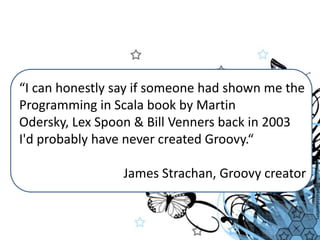
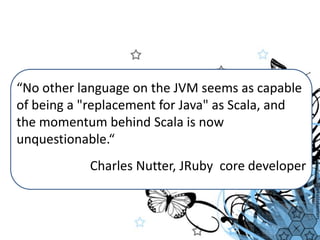
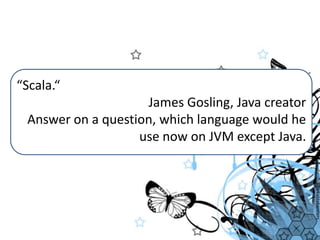
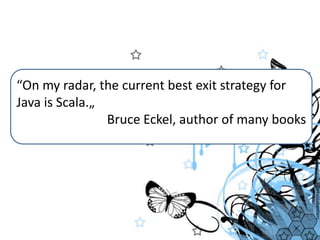
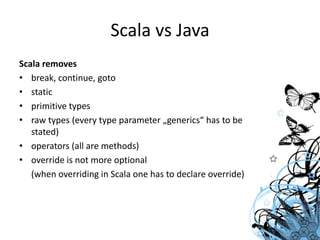
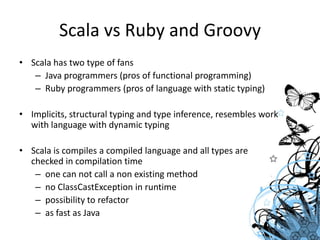
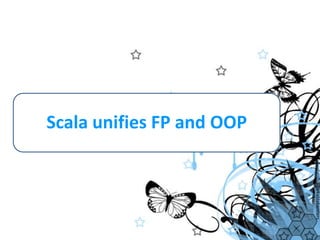
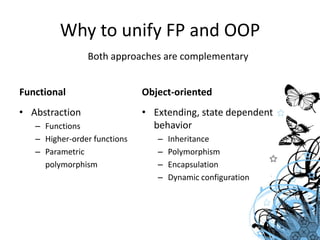
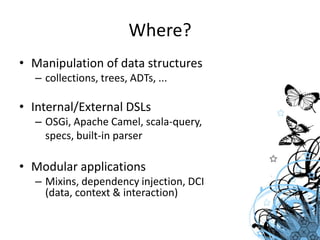
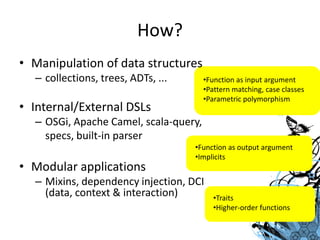
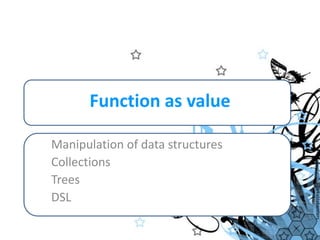
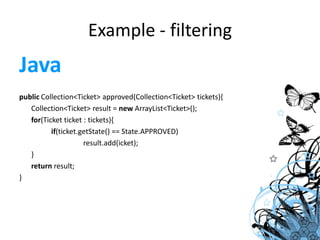
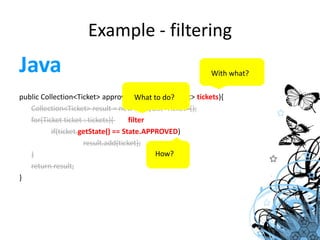
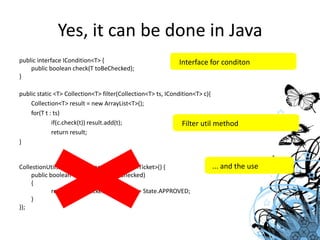
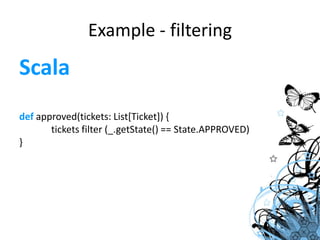
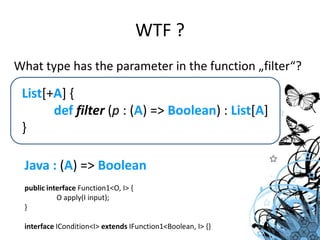
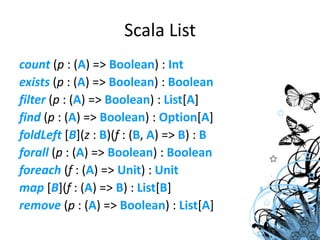
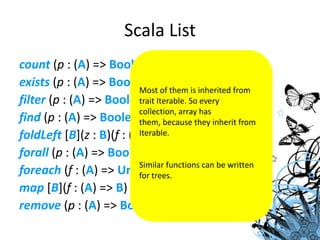
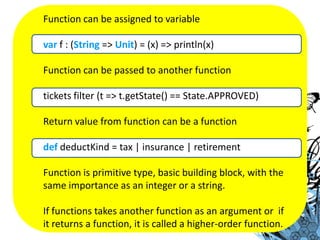
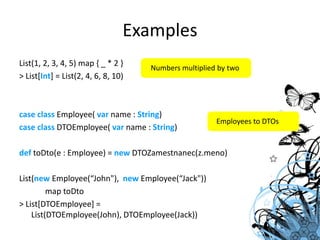
![Example - filteringScaladefapproved(tickets: List[Ticket]) { tickets filter (_.getState() == State.APPROVED) }](https://image.slidesharecdn.com/scalaen-110226172234-phpapp02/85/Scala-en-22-320.jpg)
![WTF ?What type has the parameter in the function „filter“?List[+A]{deffilter (p : (A) => Boolean) : List[A] }Java : (A) => Booleanpublic interface Function1<O, I> { O apply(I input);}interface ICondition<I> extends IFunction1<Boolean, I> {}](https://image.slidesharecdn.com/scalaen-110226172234-phpapp02/85/Scala-en-23-320.jpg)
![Scala Listcount (p : (A) => Boolean) :Intexists (p : (A) => Boolean) : Booleanfilter (p : (A) => Boolean) : List[A] find (p : (A) => Boolean) : Option[A] foldLeft [B](z : B)(f : (B, A) => B) : Bforall (p : (A) => Boolean) : Booleanforeach (f : (A) => Unit) : Unitmap [B](f : (A) => B) : List[B] remove (p : (A) => Boolean) : List[A]](https://image.slidesharecdn.com/scalaen-110226172234-phpapp02/85/Scala-en-24-320.jpg)
![Scala ListMost of them is inherited from trait Iterable. So every collection, array has them, because they inherit from Iterable.Similar functions can be written for trees.count (p : (A) => Boolean) :Intexists (p : (A) => Boolean) : Booleanfilter (p : (A) => Boolean) : List[A] find (p : (A) => Boolean) : Option[A] foldLeft [B](z : B)(f : (B, A) => B) : Bforall (p : (A) => Boolean) : Booleanforeach (f : (A) => Unit) : Unitmap [B](f : (A) => B) : List[B] remove (p : (A) => Boolean) : List[A]](https://image.slidesharecdn.com/scalaen-110226172234-phpapp02/85/Scala-en-25-320.jpg)
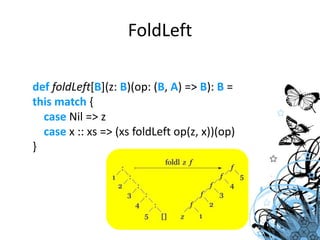
![ExamplesNumbers multiplied by twoEmployees to DTOsList(1, 2, 3, 4, 5) map { _ * 2 }> List[Int] = List(2, 4, 6, 8, 10)caseclassEmployee( varname : String)caseclass DTOEmployee( var name : String)deftoDto(e : Employee) = newDTOZamestnanec(z.meno)List(newEmployee(“John"), newEmployee(“Jack")) maptoDto> List[DTOEmployee] = List(DTOEmployee(John), DTOEmployee(Jack))](https://image.slidesharecdn.com/scalaen-110226172234-phpapp02/85/Scala-en-27-320.jpg)
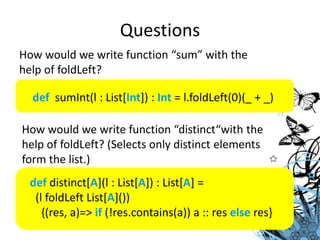
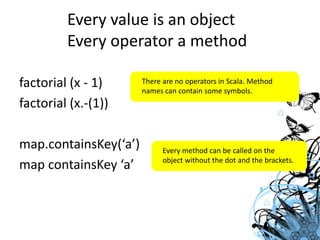
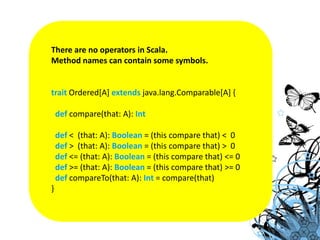
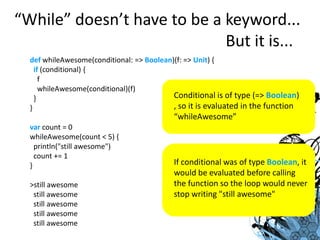
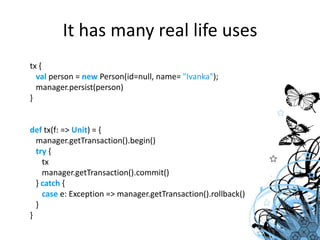
(op: (B, A) => B): B = thismatch{caseNil => zcase x :: xs => (xsfoldLeftop(z, x))(op)}](https://image.slidesharecdn.com/scalaen-110226172234-phpapp02/85/Scala-en-33-320.jpg)
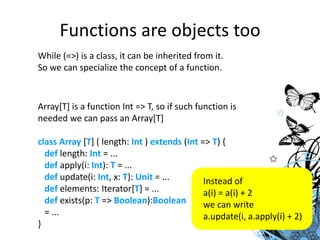
 : List[A] = (l foldLeft List[A]()) {(res, a)=> if (!res.contains(a)) a :: reselseres}defsumInt(l : List[Int]) : Int = l.foldLeft(0)(_ + _)How would we write function “distinct“with the help of foldLeft? (Selects only distinct elements form the list.)](https://image.slidesharecdn.com/scalaen-110226172234-phpapp02/85/Scala-en-35-320.jpg)
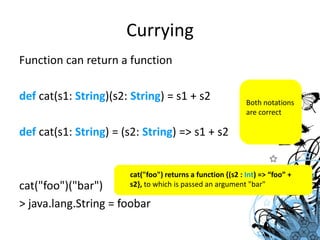
![There are no operators in Scala. Method names can contain some symbols.trait Ordered[A] extendsjava.lang.Comparable[A] {def compare(that: A): Intdef < (that: A): Boolean = (this compare that) < 0def > (that: A): Boolean = (this compare that) > 0def <= (that: A): Boolean = (this compare that) <= 0def >= (that: A): Boolean = (this compare that) >= 0defcompareTo(that: A): Int = compare(that)}](https://image.slidesharecdn.com/scalaen-110226172234-phpapp02/85/Scala-en-37-320.jpg)
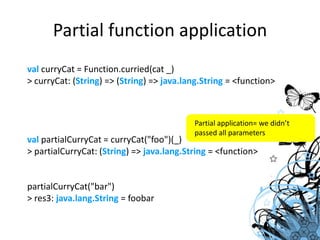
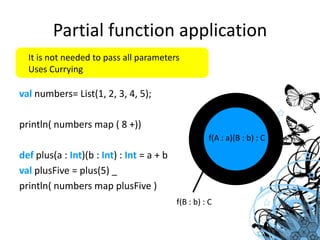
![Functions are objects tootraitFunction1[-S, +T] {defapply(x: S):T}E.g. anonymous function (x: Int ) => x + 1 is translated by the compiler tonew Function1[Int, Int] { def apply(x: Int): Int = x + 1}](https://image.slidesharecdn.com/scalaen-110226172234-phpapp02/85/Scala-en-40-320.jpg)
![Functions are objects tooWhile (=>)is a class, it can be inherited from it.So we can specialize the concept of a function.Instead ofa(i) = a(i) + 2we can writea.update(i, a.apply(i) + 2)Array[T] is a function Int => T, so if such function is needed we can pass an Array[T]classArray[T] ( length: Int) extends(Int=> T) {deflength: Int= ...defapply(i: Int): T= ...defupdate(i: Int, x: T): Unit= ...defelements: Iterator[T] = ...defexists(p: T => Boolean):Boolean = ...}](https://image.slidesharecdn.com/scalaen-110226172234-phpapp02/85/Scala-en-41-320.jpg)
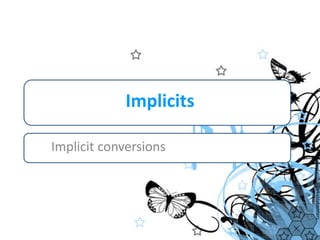
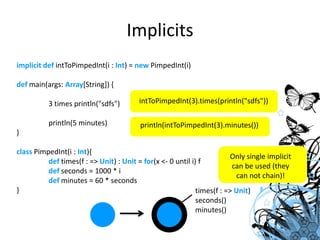
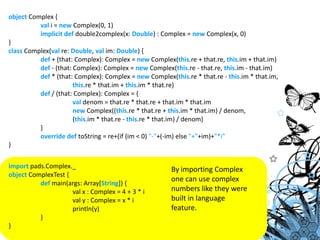
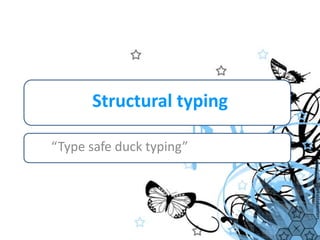
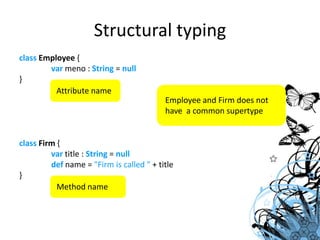
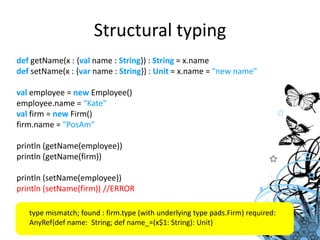
![Quicksortdef sort(xs: Array[Int]) {defswap(i: Int, j: Int) {val t = xs(i); xs(i) = xs(j); xs(j) = t}def sort1(l: Int, r: Int) {val pivot = xs((l + r) / 2)var i = l; var j = rwhile (i <= j) {while (xs(i) < pivot) i += 1while (xs(j) > pivot) j -= 1if (i <= j) {swap(i, j)i += 1j -= 1}}if (l < j) sort1(l, j)if (j < r) sort1(i, r)}sort1(0, xs.length 1)}FunctionalImperativedef sort(xs: Array[Int]): Array[Int] =if (xs.length <= 1) xselse {val pivot = xs(xs.length / 2)Array.concat( sort(xs filter (pivot >)),xs filter (pivot ==), sort(xs filter (pivot <)))}](https://image.slidesharecdn.com/scalaen-110226172234-phpapp02/85/Scala-en-48-320.jpg)
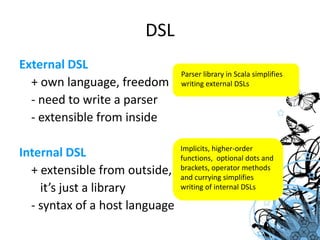
![ImplicitsOnly single implicit can be used (they can not chain)!println(intToPimpedInt(3).minutes())implicitdefintToPimpedInt(i : Int) = newPimpedInt(i)defmain(args: Array[String]) { 3 timesprintln("sdfs")println(5 minutes)}classPimpedInt(i : Int){deftimes(f : => Unit) : Unit = for(x <- 0 until i) fdefseconds = 1000 * idefminutes = 60 * seconds}intToPimpedInt(3).times(println("sdfs"))times(f : => Unit)seconds()minutes()](https://image.slidesharecdn.com/scalaen-110226172234-phpapp02/85/Scala-en-50-320.jpg)
![objectComplex {val i = newComplex(0, 1)implicitdef double2complex(x: Double) : Complex = newComplex(x, 0)}classComplex(valre: Double, val im: Double) {def + (that: Complex): Complex = new Complex(this.re + that.re, this.im + that.im)def - (that: Complex): Complex = new Complex(this.re - that.re, this.im - that.im)def * (that: Complex): Complex = new Complex(this.re * that.re - this.im * that.im,this.re * that.im + this.im * that.re)def / (that: Complex): Complex = { valdenom = that.re * that.re + that.im * that.imnew Complex((this.re * that.re + this.im * that.im) / denom, (this.im * that.re - this.re * that.im) / denom)}overridedeftoString = re+(if (im < 0) "-"+(-im) else"+"+im)+"*i"}By importing Complex one can use complex numbers like they were built in language feature.import pads.Complex._objectComplexTest {defmain(args: Array[String]) { val x : Complex = 4 + 3 * ival y : Complex = x * i println(y)}}](https://image.slidesharecdn.com/scalaen-110226172234-phpapp02/85/Scala-en-51-320.jpg)
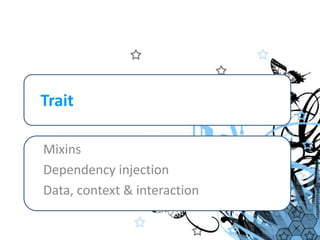
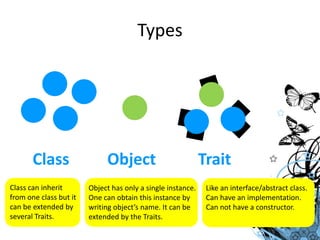
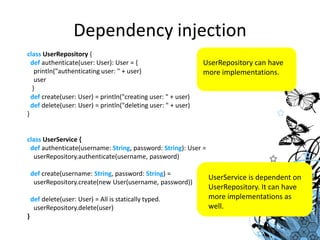
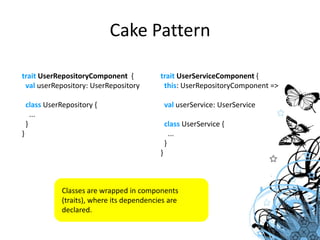
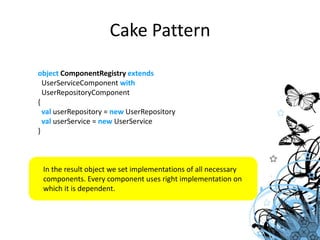
![External DSL written with the help of library scala.util.parsing.combinator._ /** @returnParser[Money] */defpercentage = toBe ~> doubleNumber <~ "percent" <~ "of" <~ "gross" ^^ {percentage => grossAmount * (percentage / 100.) }defamount = toBe ~> doubleNumber <~ "in" <~ "gross" <~ "currency" ^^ { Money(_) }deftoBe = "is" | "are"defdoubleNumber = floatingPointNumber ^^ { _.toDouble }|, ~> , <~, ^^ are just functionsLibrary pasing.combinator is internal DSL](https://image.slidesharecdn.com/scalaen-110226172234-phpapp02/85/Scala-en-57-320.jpg)
: Parser[U] = map(f).named(toString+"^^")](https://image.slidesharecdn.com/scalaen-110226172234-phpapp02/85/Scala-en-58-320.jpg)
